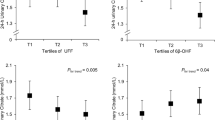Abstract
Infection-triggered, life-threatening salt-loss and hyperkalaemia developed in two male infants with wasting, inappropriately low plasma aldosterone concentrations and elevated plasma renin activity. The presumptive diagnosis of a defective terminal step in aldosterone biosynthesis was made by the presence of large amounts of 11-dehydrotetrahydrocorticosterone and its 18-hydroxylated metabolite (18-OH-THA), free 18-hydroxycorticosterone (18-OH-B) and 18-hydroxytetra-hydrocorticosterone in the urine of both patients. The diagnosis of corticosterone methyl oxidase type II (CMO II) deficiency was confirmed by an elevated urinary 18-OH-THA to tetrahydroaldosterone ratio in one boy and by an elevated plasma 18-OH-B to aldosterone ratio in the other boy. Unknown steroids responsible for the salt-loss were not identified. Sodium supplementation but not short-term high dose oral 9α-fluorcortisol (FF) normalized the hyponatraemia in one patient, in whom sodium (Na+)/potassium (K+) co-transport was decreased. Both patients eventually received long-term FF treatment to prevent impairment of longitudinal growth caused by chronic salt-loss. The diagnosis of CMO II deficiency should always be confirmed by elevated precursor-product ratios in urine or plasma, using radioimmunoassays with prior chromatographic separation. Metabolic studies as the short-term response of serum Na+ to high dose FF may not be helpful in differentiating aldosterone biosynthetic defects from endorgan resistance to mineralocorticoids.
Similar content being viewed by others

Abbreviations
- ACTH:
-
adrenocorticotropic hormone
- Aldo-18-Glu:
-
aldosterone-18-glucuronide
- CMO II:
-
corticosterone methyl oxidase II
- DOC:
-
11-desoxycorticosterone
- FF:
-
9α-fluorcortisol
- HHB:
-
hexahydrocorticosterone
- HS:
-
high sodium (intake)
- LS:
-
low sodium (intake)
- 18-OH-B:
-
18-hydroxycorticosterone
- 18-OH-DOC:
-
18-hydroxy-11-deoxycorticosterone
- 17-OHP:
-
17-hydroxyprogesterone
- 18-OH-THA:
-
18-hydroxytetrahydro-11-dehydrocorticosterone
- 18-OH-THB:
-
18-hydroxytetrahydrocorticosterone
- PRA:
-
plasma renin activity
- 86Rb:
-
rubidium chloride Rb 86
- THA:
-
tetrahydro-11-dehydrocorticosterone
- THAldo:
-
tetrahydroaldosterone
- THB:
-
tetrahydrocorticosterone
References
Ammenti A, Müller-Wiefel DE, Schärer K, Vecsei P (1980) Mineralocorticoids in the nephrotic syndrome of children. Clin Nephrol 14:238–245
Bianchi L, Barlassina C (1983) Renal function in essential hypertension. In: Genest J, Kuchel O, Hamet P, Cantin M (eds) Hypertension, 2nd edn. McGraw-Hill, New York, pp 54–73
Gláz E, Kiss R, Lada G, Vida S, Vajda L, Katrics E (1979) Pathophysiological, clinical and therapeutic aspects of hyperaldosteronism. In: Gláz E (ed) On the pathomechanism, clinical and therapeutic aspects of hyperaldosteronism. Boehringer Mannheim Ltd Publ. Hungexpo-Budapest, pp 43–91
Globerman H, Rösler A, Theodor R, New MI, White PC (1988) An inherited defect in aldosterone biosynthesis caused by a mutation in or near the gene for steroid 11-hydroxylase. N Engl J Med 319:1193–1197
Kuhnle U, Rösler A, Pareira JA, Gunzcler P, Levine LS, New MI (1983) The effects of long-term normalization of sodium balance on linear growth in disorders with aldosterone deficiency. Acta Endocrinol (Copenh) 102:577–582
Rösler A (1984) The natural history of salt-wasting disorders of renal and adrenal origin. J Clin Endocrinol Metab 59:689–700
Schrier RW, Leaf A (1981) Effect of hormones on water, sodium, chloride, and potassium metabolism. In: Williams RH (ed) Textbook of endrocrinology, 6th edn. WB Saunders, Philadelphia, pp 1032–1046
Shackleton CHL (1985) Mass spectrometry: application to steroid and peptide research. Endocr Rev 6:441–486
Shackleton CHL (1986) Profiling steroid hormones and urinary steroids. J Chromatogr 379:91–156
Shackleton CHL, Honour JW (1976) Simultaneous estimation of urinary steroids by semiautomated gas chromatography. Investigation of neonatal infants and children with abnormal steroid synthesis. Clin Chim Acta 69:267–283
Shackleton CHL, Whitney JO (1980) Use of Sep-Pak cartridges for urinary steroid extraction: Evaluation of the method for use prior to gas chromatographic analysis. Clin Chim Acta 107:231–243
Ulick S (1976) Diagnosis and nomenclature of the disorders of the terminal portion of the aldosterone biosynthetic pathway. J Clin Endocrinol Metab 43:92–96
Veldhuis JD, Kulin HE, Santen RJ, Wilson TE, Melby JC (1980) Inborn error in the terminal step of aldosterone biosynthesis. Corticosterone methyl oxidase type II deficiency in a North American pedigree. N Engl J Med 303:117–121
Veldhuis JD, Melby JC (1981) Isolated aldosterone deficiency in man: acquired and inborn errors in the biosynthesis or action of aldosterone. Endocr Rev 2:495–517
Wambach G, Schmülling V, Kaufmann W (1985) Na-K pump activity in erythrocytes of patients with endogenous and exogenous glucocorticoid excess. Cardiology. [Suppl I] 72:95–98
Author information
Authors and Affiliations
Additional information
Dedicated to Professor Dr. Walter Teller, on the occasion of his 60th birthday
Rights and permissions
About this article
Cite this article
Hauffa, B.P., Sólyom, J., Gláz, E. et al. Severe hypoaldosteronism due to corticosterone methyl oxidase type II deficiency in two boys: metabolic and gas chromatography-mass spectrometry studies. Eur J Pediatr 150, 149–153 (1991). https://doi.org/10.1007/BF01963554
Received:
Accepted:
Issue Date:
DOI: https://doi.org/10.1007/BF01963554



